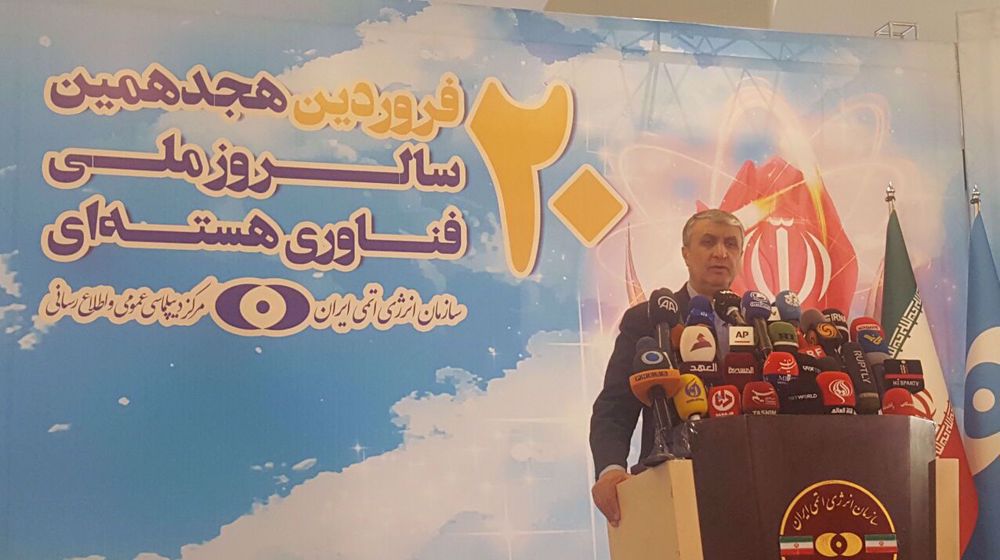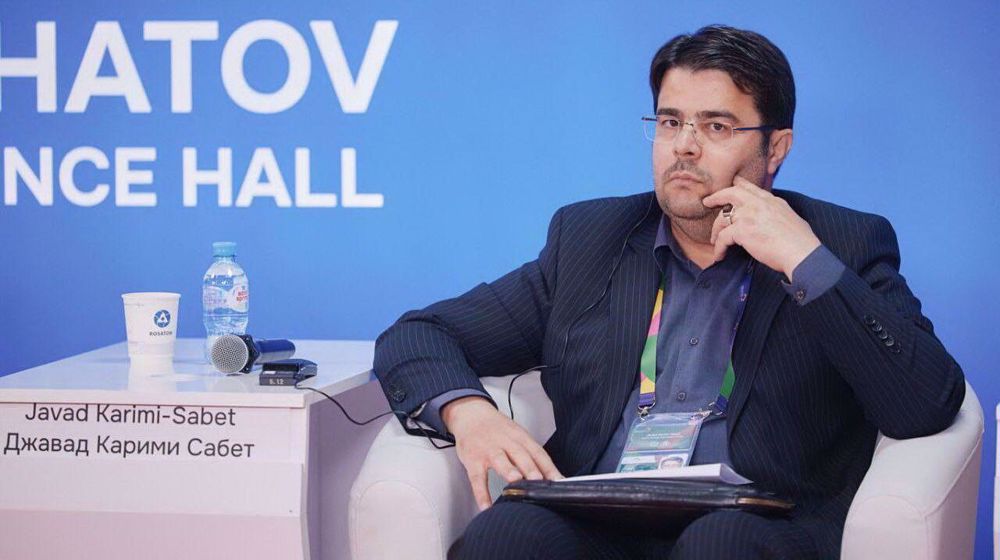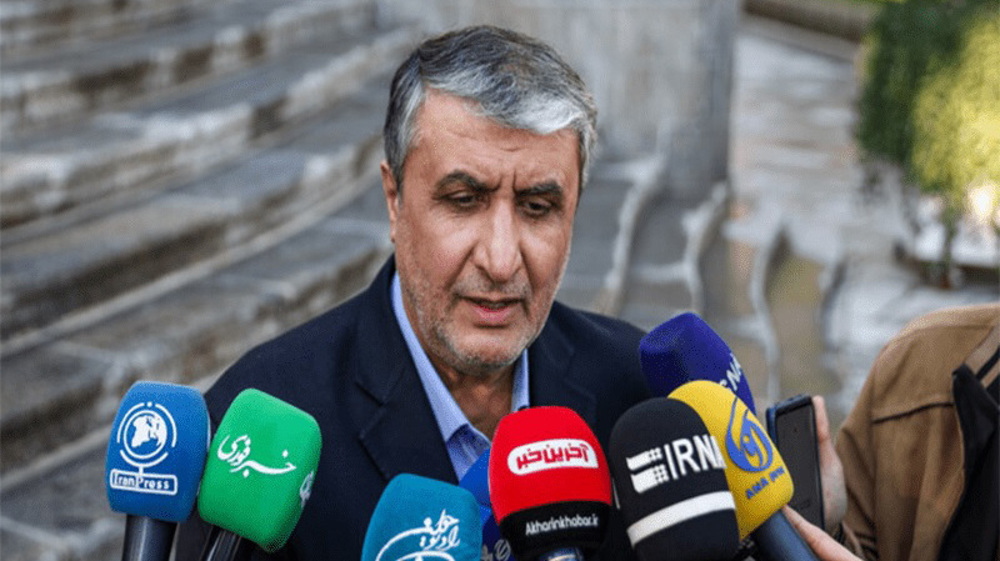Iran, P5+1 ministers hold fresh nuclear talks in Vienna
Iran and the P5+1 group of world countries have held a plenary ministerial meeting in the Austrian capital, as part of last-ditch efforts to finalize a comprehensive agreement over Tehran's nuclear program.
Iranian Foreign Minister Mohammad Javad Zarif met his counterparts from the US, the UK, France, Germany, Russia and Germany as well as EU foreign policy chief Federica Mogherini from 5:00 p.m. local time (1500 GMT) in Vienna on Monday, one day before the extended July deadline for the marathon negotiations for a final nuclear deal.
Zarif had prior to the plenary talks held separate one-on-one meetings with US Secretary of State John Kerry and Russian Foreign Minister Sergei Lavrov.
This as earlier in the day, an Iranian official said there are only "a few" issues reaming in negotiations over Tehran's nuclear program between the Islamic Republic and the P5+1 group of world countries.
“Three months ago there were a number of unresolved issues," the official, requesting not to be named, said on Monday, AFP reported.
“But now there are only a few items left which need to be tackled by the ministers. That is why the ministers are here," he noted.
Experts who have been meeting in Vienna "have moved a lot further" but "there are tough issues ... which were not resolved at expert level or the deputy minister level, those are not easy issues."
The official further underlined Tehran's demand for reciprocal so-called "snapback" measures.
"If there are issues that we have for instance in regard to sanctions termination the same procedure has to be applied to that issues as well," the Iranian official said.
"To put it broadly, snapback is something that needs to be provided to all sides, not only one side."
He insisted that Iran had already "made a number of concessions, we have shown a good amount of flexibility. I suppose everybody has done so."
China FM cites new progress in Iran talks
Meanwhile, Chinese Foreign Minister Wang Yi says "new progress" has been made in the course of nuclear negotiations between senior diplomats from Iran and five permanent members of the UN Security Council – the United States, Britain, France, Russia and China – plus Germany.

"New progress has been made in the negotiations in the past several days, there are still several outstanding issues on the table. We believe that acceptable solutions can be found to those outstanding issues, hence the comprehensive agreement is within reach,” Wang told reporters in the Austrian capital, Vienna, on Monday.
He added, “What is important is that today and tomorrow all parties, especially the United States and Iran, should make their final decisions as quickly as possible. Today, I am coming back to make a special trip to Vienna to demonstrate China's readiness to continue to play a steering role and to make its contribution to the advancement of the negotiations until we reach a final agreement.”
P5+1 FMs meeting on Iran nuclear program
Also on Monday, the foreign ministers of the Security Council’s five veto-wielding permanent members plus Germany took part in a coordination meeting on Iran’s nuclear case in Vienna.

The meeting took place behind closed doors without representatives from Tehran.
Differences remain in nuclear talks: Zarif
In his latest comments, Zarif said Iran and the P5+1 group of countries still face differences on some issues pertaining to the Islamic Republic’s nuclear program, as an extended deadline set to reach a final deal approaches.
“We are trying to solve some remaining differences,” Zarif told reporters in Vienna, the venue of the latest round of talks between Iran and the six world powers, late Sunday.

He said differences are still there, adding that the outcome is not yet clear.
Representatives from Iran and the P5+1 group of countries have been holding crunch talks at the Palais Coburg in Vienna over the past ten days to hammer out a final comprehensive deal. They are racing against the clock with just one day left before the extended July 7 deadline for a landmark nuclear deal.

Speaking from Vienna, Press TV’s correspondent Homa Lezgee said that the sides in the negotiations have "announced their readiness to make this agreement operational in practice, that sanctions are effectively removed,” adding, "There are a lot of scientific details or technical details involved” in the talks.
“Iran has made it clear that it will take the transparency measures,” she said.
The Press TV correspondent said Iranian representatives at the negotiations stressed in the talks that for Tehran it is “important to keep the production of heavy water [at Arak plant] despite the redesigning that would reduce or halt the production of weapons-grade plutonium” as a by-product.
“We know that in the underground Fordow facility Iran wants to keep at least 1,000 centrifuges although they will not be operational. And Iran has previously said after Lausanne that it would want to keep 350 them spinning to produce … radio-isotopes,” she added.
MP/NN/HMV
VIDEO | Mass rallies held in major US cities in support of Gaza
VIDEO | Press TV's news headlines
Israel kidnapped 3,000 Palestinians since start of genocidal war: Report
Iran operation further debunks Israel’s invincibility myth: Commander
Germany's Scholz seeks collaboration with China in 'just peace' in Ukraine
UN chief says attacks against civilians in Sudan could constitute ‘war crimes’
Slightest act against Iran’s interests will be met with ‘painful response’: Raeisi
US House to vote on long-awaited assistance for Ukraine









 This makes it easy to access the Press TV website
This makes it easy to access the Press TV website